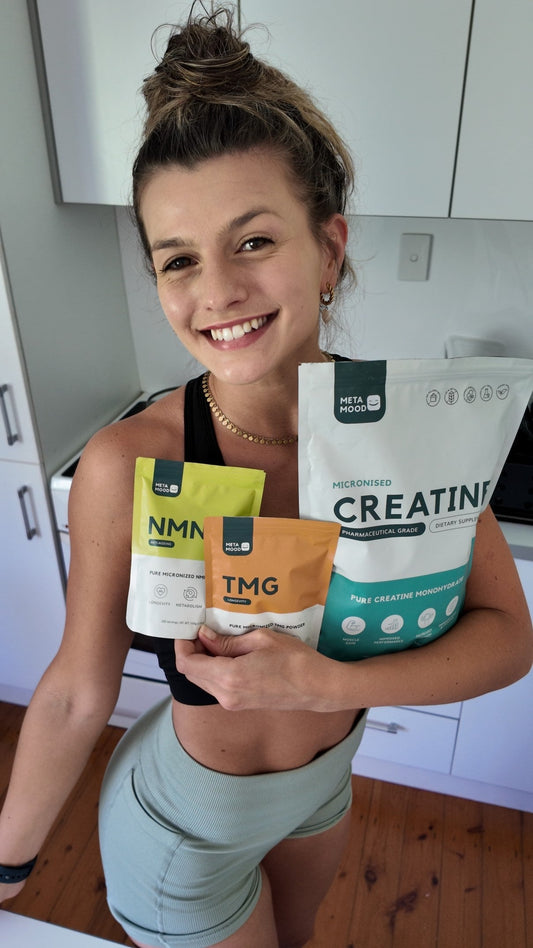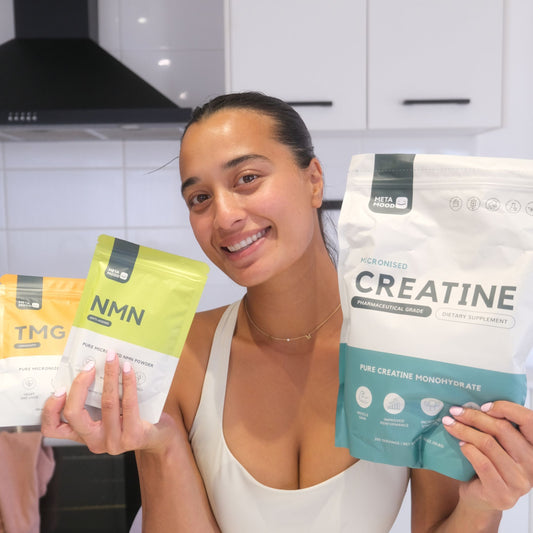Creatine and TMG (Trimethylglycine) are two powerful supplements often taken separately for their distinctive benefits. However, combining them may amplify their positive effects on strength, energy, and cognitive health. Let's delve into how TMG and creatine work together and why considering them in tandem might enhance your overall wellness.
Understanding TMG and Creatine
What is Creatine?
Creatine is an amino acid derivative naturally produced in the body, primarily known for its role in replenishing ATP (adenosine triphosphate)—the energy currency of cells. Supplementing creatine is safe for women and men and boosts muscle energy stores, enhances physical performance, and supports cognitive function (Buford et al., 2007).
What is TMG?
TMG, also known as betaine, acts primarily as a methyl donor, facilitating crucial processes like DNA repair, liver detoxification, and neurotransmitter synthesis. Additionally, TMG aids in regulating homocysteine levels, thus promoting cardiovascular and cognitive health (Craig, 2004). TMG is also naturally present in foods such as beets, spinach, wheat germ, quinoa, and shrimp — although cooking, especially boiling, can significantly reduce its content.
How TMG Enhances Creatine's Benefits
Supporting Methylation During Creatine Supplementation
Supplementing with creatine can increase the body's demand for methyl groups. When creatine converts into phosphocreatine, it consumes methyl groups, potentially straining your methylation pathways. TMG supplements additional methyl groups, ensuring your body's methylation processes remain balanced and efficient, particularly important during prolonged creatine supplementation (Dayal & Lentz, 2012).
Boosting Strength and Muscle Performance
Creatine enhances strength, power output, and muscle recovery by replenishing energy stores in muscles. TMG complements these effects by supporting cellular hydration and reducing muscle fatigue, further enhancing physical performance and endurance (Hoffman et al., 2009). Some studies also suggest that TMG may boost nitric oxide production, which improves blood flow and oxygen delivery to working muscles — potentially enhancing endurance and recovery.
Enhanced Energy Metabolism
TMG supports optimal liver function and fat metabolism, contributing to more efficient energy production. Coupled with creatine's role in quickly regenerating ATP, this combination provides both immediate and sustained energy, benefiting athletes and active individuals alike (Kathirvel et al., 2013).
Cognitive Benefits of Combining TMG With Creatine
Improved Cognitive Performance and Memory
Creatine supplementation alone enhances cognitive functions, such as memory, focus, and reaction speed, especially under fatigue or stress. Adding TMG provides essential methylation support, further optimizing neurotransmitter synthesis and brain energy metabolism, which can significantly enhance cognitive clarity and mental stamina (McMorris et al., 2007).
Neuroprotective Effects
Both creatine and TMG demonstrate protective effects on brain health. Creatine supports neuronal energy supply and resilience against stress, while TMG promotes DNA repair and reduces oxidative stress in brain cells. Their synergistic actions potentially lower the risk of cognitive decline and neurodegenerative diseases (Smith et al., 2014).

Considering the Evidence
While many studies show significant benefits of TMG and creatine individually and in combination, the research is not entirely unanimous. Some trials report substantial gains in muscle endurance, sprint performance, and body composition, while others find minimal or no measurable effect. This means results may vary depending on dosage, training style, and individual physiology.
Who Can Benefit From Taking TMG and Creatine Together?
Athletes and Fitness Enthusiasts
Individuals engaged in high-intensity or endurance training can significantly benefit from this combination, experiencing enhanced performance, quicker recovery, and increased muscle strength.
Individuals Seeking Cognitive Enhancement
Professionals, students, or anyone facing cognitive challenges or stress can benefit from the cognitive boost provided by creatine and the methylation support from TMG, enhancing memory, concentration, and mental stamina.
Older Adults
As aging impacts energy metabolism, cognitive function, and muscle strength, older adults may find the combination of TMG and creatine particularly beneficial in maintaining physical vitality, cognitive sharpness, and overall wellness.
Individuals Managing Cardiovascular Health
Those aiming to reduce homocysteine levels and support heart health will find TMG's methylation support particularly useful, complemented by creatine's benefits in supporting overall physical health.
How to Supplement TMG and Creatine Effectively
-
Creatine Dosage: Typically, 3-5 grams per day.
-
TMG Dosage: Generally, 500–2000 mg daily, depending on dietary habits and individual methylation needs. Research has tested doses up to 20 g/day, but higher intakes are more likely to cause digestive upset or — in very rare cases — excessive methionine buildup, which can lead to serious complications.
-
Timing: Both supplements can be taken together, ideally post-workout or in the morning.
-
Hydration: Ensure adequate water intake to optimize both supplements' efficacy.
Conclusion
Using TMG in conjunction with creatine supplementation can significantly amplify their individual benefits, enhancing physical strength, energy metabolism, and cognitive health. This synergy not only boosts athletic output but also helps maintain long-term cardiovascular and brain health by reducing homocysteine and supporting methylation balance. This powerful combination supports overall well-being, making it an ideal strategy for those aiming to maximize their physical and mental performance.
Frequently Asked Questions
Can I take TMG and creatine together?
Yes, TMG and creatine can be taken together, and they may even work synergistically. Creatine boosts energy and performance, while TMG supports methylation and reduces homocysteine buildup from creatine metabolism. This combination can enhance both athletic output and long-term health.
Is TMG similar to creatine?
Not exactly — creatine is primarily used to quickly regenerate ATP for short bursts of energy, while TMG is a methyl donor that supports creatine production and other essential metabolic processes. They serve different roles but complement each other well.
What should you not mix with creatine?
Creatine is generally safe to stack with most supplements, but you should avoid combining it with excessive caffeine, which may reduce its effectiveness for some people. If you have kidney issues or take medications affecting kidney function, consult your doctor before using creatine.
What supplements should I take with TMG?
TMG pairs well with creatine, B-complex vitamins (especially B6, B12, and folate), and nitric oxide boosters like beetroot powder or citrulline. These combinations can maximize energy production, cardiovascular health, and workout performance.
References
-
Buford, T. W., Kreider, R. B., Stout, J. R., Greenwood, M., Campbell, B., Spano, M., Ziegenfuss, T., Lopez, H., Landis, J., & Antonio, J. (2007). International Society of Sports Nutrition position stand: creatine supplementation and exercise. Journal of the International Society of Sports Nutrition, 4, 6. https://doi.org/10.1186/1550-2783-4-6
-
Craig, S. A. (2004). Betaine in human nutrition. American Journal of Clinical Nutrition, 80(3), 539-549. https://doi.org/10.1093/ajcn/80.3.539
-
Dayal, S., & Lentz, S. R. (2012). ADMA and hyperhomocysteinemia. Vascular Medicine, 17(2), 71-77. https://doi.org/10.1177/1358863X11433630
-
Hoffman, J. R., Ratamess, N. A., Kang, J., Rashti, S. L., & Faigenbaum, A. D. (2009). Effect of betaine supplementation on power performance and fatigue. Journal of the International Society of Sports Nutrition, 6(1), 7. https://doi.org/10.1186/1550-2783-6-7
-
Kathirvel, E., Morgan, K., Nandgiri, G., Sandoval, B. C., Caudill, M. A., Bottiglieri, T., French, S. W., & Morgan, T. R. (2013). Betaine improves nonalcoholic fatty liver and associated hepatic insulin resistance: a potential mechanism for hepatoprotection by betaine. American Journal of Physiology-Gastrointestinal and Liver Physiology, 305(3), G185-G194. https://doi.org/10.1152/ajpgi.00342.2012
-
McMorris, T., Harris, R. C., Swain, J., Corbett, J., Collard, K., Dyson, R. J., Dye, L., Hodgson, C., & Draper, N. (2007). Creatine supplementation and cognitive performance in elderly individuals. Neuropsychology, Development, and Cognition. Section B, Aging, Neuropsychology and Cognition, 14(5), 517-528. https://doi.org/10.1080/13825580600788100
-
Smith, R. N., Agharkar, A. S., & Gonzales, E. B. (2014). A review of creatine supplementation in age-related diseases: more than a supplement for athletes. F1000Research, 3, 222. https://doi.org/10.12688/f1000research.5218.1




